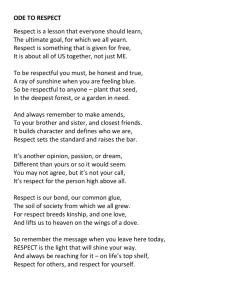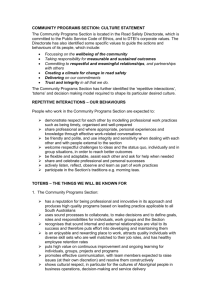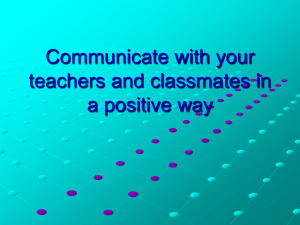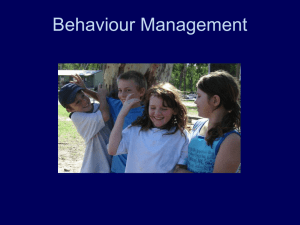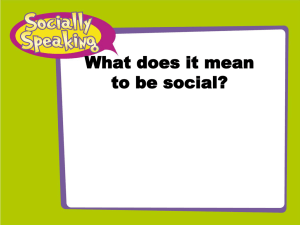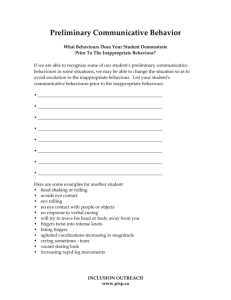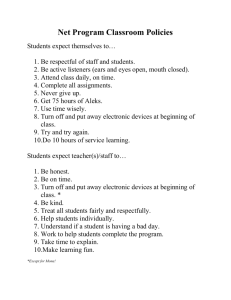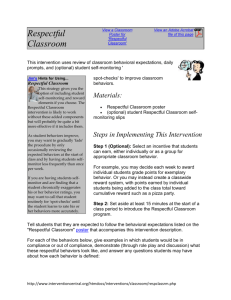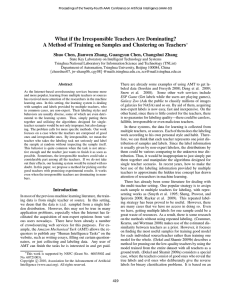Civics and Citizenship in practice
advertisement
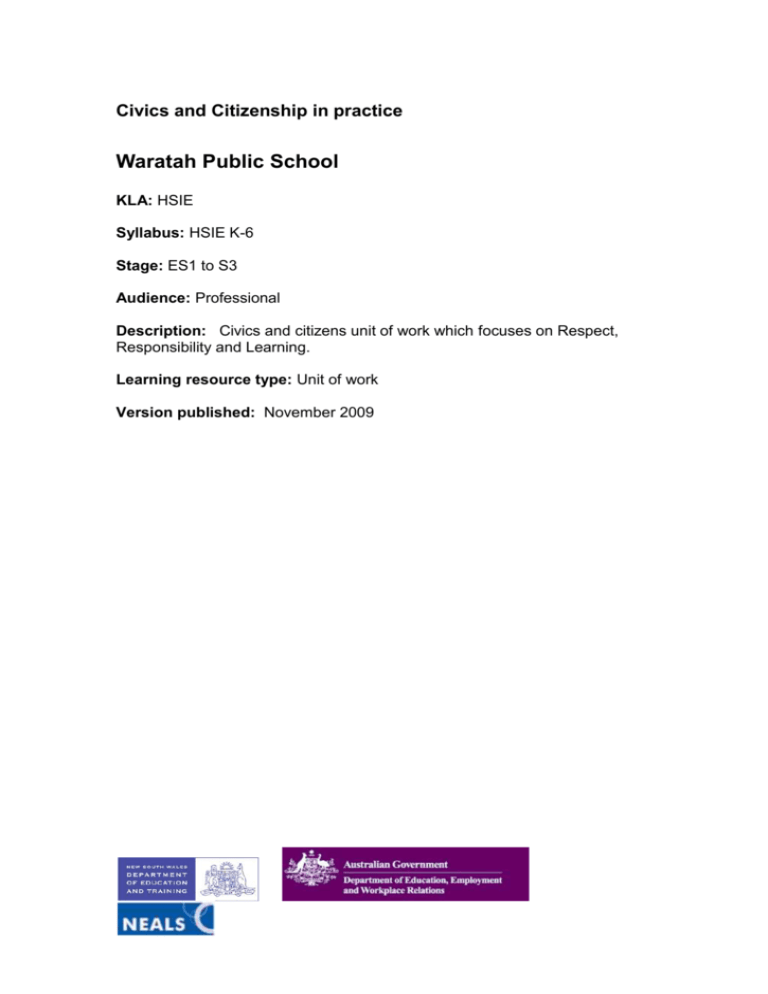
Civics and Citizenship in practice Waratah Public School KLA: HSIE Syllabus: HSIE K-6 Stage: ES1 to S3 Audience: Professional Description: Civics and citizens unit of work which focuses on Respect, Responsibility and Learning. Learning resource type: Unit of work Version published: November 2009 Respect Educational Goals Students learn: How to be respectful people Treat other the way you want them to treat you Treating people with the respect makes better relationships How to be respectful list Treat other people the way you want to be treated Be courteous and polite Listen to what other people have to say Care for my school and environment Take pride in myself and my school Student Activities Lesson 1 The Fuzzy Feeling Chair A special chair (e.g. a bean bag, stool) is positioned in the room. Each day ask a different student to sit in the special chair. The other students then take turns saying nice things about the person in the chair. The person in the chair can only say thank you. At the end of the activity ask the child sitting in the chair how they felt when others were saying nice things about them. Lesson 2 Paper chains Using different coloured paper strips students write one talent on each strip of paper (each student has 5 strips of paper) and create paper chains. Links are joined together to make a long class chain. Ask the class what the chain demonstrates. Lesson 3 What does it mane to treat other people with respect? Have you class brainstorm a list of do’s and don’ts for treating people with respect. Ask for specific examples of each behaviour they identify. Compare their list with the respectful list above. Hang the list on the wall as a reminder. Lesson 4 Go through each item on the list. Using a book from the resource list, have the students describe how characters demonstrate respect or what characters could have done to be more respectful. Lesson 5 Make a class contract in which students lay out a set of rules for having a respectful classroom. What will be the consequences of their choices? Lesson 6 Brainstorm ways to make the school environment more respectful. Create a list of recommendations, and present them to your SRC. Lesson 7 Have the students role play or use puppets to act out the following situation: Four good friends are planning to spend the day at an amusement park. Two of them want to invite another student who is new to the school. The other two don’t want to include this student because she/ he is different in some way (culturally, a ‘dweeb’ or has a disability etc.). After the role play have a class discussion. Then have four other students do the role play changing what is different about the new student. Repeat the process with the difference changing each time. Lesson 8 Bring in articles from newspapers and magazines describing situations in respect and disrespect are issues. Talk about who is acting respectfully and who is acting disrespectfully in these situations. Lesson 9 Using a book from the resource list, draw a picture and write a description of a character. Tell how you would treat them if they want to join in a game with you and your friends. Lesson 10 Write about an experience you had with a person who did not show respect. What happened and how did it make you feel? Lesson 11 Are students not shown respect at your school? How do you think these students feel about this? How do you feel about this? Lesson 12 In what ways do you treat people with respect? Are there any ways in which you could improve your skills in this area? Lesson 13 Write a letter to an imaginary bully telling this person what she or he is doing that you don’t like, why you don’t like it and how you want this person to behave instead. Responsibility Educational Goals Students learn: What responsibility is and what a responsibility person does Why is important to behave responsibly How irresponsible behaviour can damage their relationships with others That being a responsible person results in better friendships How to solve problems by thinking How to be responsible list Be reliable and dependable: when you agree to do something do it Take care of your own business. Don’t make excuses or blame others Use your head: think before you act: imagine the consequences Student Activities Lesson 1 Write the responsible list on the board. Have the students think of as many examples of each they can, and write them on the board. Can they think of any responsible behaviours that should be added to the list? Have a class discussions about these behaviours. Have the students make a poster of these behaviours to put up around the school. Lesson 2 Take the example from lesson 1 above, and turn them into role-play situations. The students can act them out themselves or use puppets. First, have them role-play irresponsible behaviour, and then, the responsible behaviour. Have the group critique each of the role-plays. Lesson 3 For the upper grades: have the students look for magazine or newspaper articles in which responsibility is an issue. Discuss the issues in the context of responsible and irresponsible actions. What are the stakes? What are the consequences? Lesson 4 How responsible are you? For each responsible listed, rate yourself on a scale of 1 to 5 (1 = awful and 5 = terrific). For each of these behaviours give an example of how you are responsible or not, and what you could do to improve. Lesson 5 Can your think of a time when you did something irresponsible? Describe it in detail. Why did it happen? How did you feel about it at the time? Did it affect anybody else? Did it cause any problems for you? How do you feel about it now? What did you learn from it? Or, perhaps you would prefer to write about something you do that was very responsible. Lesson 6 If your students are old enough to write book reports, have them write about the how the characters in the book behaved in wither a responsible or irresponsible way. Do the same with movies or television programs they have seen. If your students are too young to write a book report, so this as a class discussion about the books they are reading or that you are reading to them. Lesson 7 Write about someome you think is responsible. What do you like about that person? Lesson 8 Write about how it makes you feel when somebody lets you down. Learning Educational Goals Students learn: Basic life long skills that help us work successfully together The benefits of being a life long learner How to cooperate with others How to be an effective learner list Listen carefully to others and be sure you understand what they are saying Share when you have something that others would like to have Take turns when there is something that nobody wants to do, or when more than one person wants to do the dame thing Do your part the very best you possibly can Encourage people to do their best Make people feel needed, Working together is a lot more fun that way. Student activities Lesson 1 Break students into four groups and tell them they’re going to make music. One group claps, one group whistles, one group taps on the seats, one group makes sushing sounds with their mouth (like cymbals). Each group plays their sound when you point to them. The object is for each group to get coordinated into something that sounds good without talking to the other members of the group. In order to accomplish this they have to listen to what each other is doing and adjust accordingly. Point to the groups one at a time, letting each group get their act together. Then start adding groups together allowing time for them to adjust what they are doing until they sound good. Eventually all the groups will be going at once in a well coordinated ensemble. When the concert is over ask the students what made this activity fun and why it required cooperation to make it work. What would have made it work better? If it did’nt work why not?
